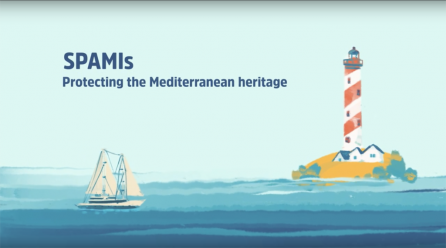The SPAMI Project
Title:
Developing and strengthening an effective management of Specially Protected Areas of Mediterranean Importance.
Project period:
2018-2019
Context:
The Contracting Parties to the Barcelona Convention established the List of Specially Protected Areas of Mediterranean Importance (SPAMI List) through the SPA/BD Protocol, in order to promote cooperation in the management and conservation of natural areas, as well as in the protection of threatened species and their habitats.
The SPAMI Project, implemented in the framework of the Memorandum of Understanding between the United Nations Environment Programme (UN Environment) and the Italian Ministry for Environment, Land and Sea (IMELS), aims to contribute to the achievement of the Aichi Target 11, and SDG 14.5 in the Mediterranean, by developing and strengthening an effective management of marine protected areas and particularly Specially Protected Areas of Mediterranean Importance (SPAMIs).
The activities are envisaged to develop twining programmes among Italian SPAMIs/MPAs and SPAMIs/MPAs of the Mediterranean sub-regions of which Italy is part, in order to promote networking and standardize management. The project aims to support best practices and experience sharing between the twin SPAMIs/MPAs, build capacities, and involve civil society organizations (CSOs).
Specific objectives:
- Twinning among Italian SPAMIs/MPAs and SPAMIs/MPAs from countries of the Mediterranean sub-regions of which Italy is part;
- Sharing best practices of management and monitoring between the twin SPAMIs/MPAs;
- Building capacities of SPAMI/MPAs managers;
- Involving Civil Society Organisations in SPAMI/MPA management;
- Setting up a collaborative platform for existing or future SPAMIs.
Main activities:
SPA/RAC activities focus on the following actions:
- Identification of the twinning partners;
- Definition of specific contents of each twinning programme and signature of twinning agreements between 4 Italian SPAMIs/MPAs and 4 other SPAMIs/MPAs;
- Holding a kick-off meeting;
- Sharing, among the twinned areas, best practices and management strategies;
- Setting up monitoring programmes to contribute to the Integrated Monitoring and Assessment Programme (IMAP) developed in the framework of the Barcelona Convention’s Ecosystem Approach Roadmap;
- Visits of the SPAMIs/MPAs managers in the twinned area, to support the application and implementation of the above models and strategies;
- Carrying out participatory processes aiming to involve stakeholders in the identified management strategies;
- Organizing on-the-job training sessions for a better operational management in the twinned SPAMIs/MPAs;
- Implementing concrete management actions on the field at twinned SPAMIs/MPAs level;
- Involvement of the civil society in SPAMIs/MPAs activities through calls for projects, and implementation of small projects activities on the field at twinned SPAMIs/MPAs level;
- Communication and capitalization material about lessons learnt and innovative approaches of the small projects implemented by the civil society organizations at twinned SPAMIs/MPAs level;
- Establishing a collaborative platform for SPAMIs/MPAs based on the experience gained during the twinning activities.
Beneficiary countries:
Five (5) Mediterranean countries (from the sub-regions of which Italy is part): Albania, Algeria, Italy, Slovenia and Tunisia.
Target groups:
MPA managers, CSOs and relevant authorities in the countries concerned by the project.
For more information about the SPAMI Project, please contact:
Partners:
The SPAMI Project is managed by UN Environment/MAP and executed by SPA/RAC.

The SPAMI project is financially supported by the Italian Ministry for Environment Land and Sea (IMELS).




